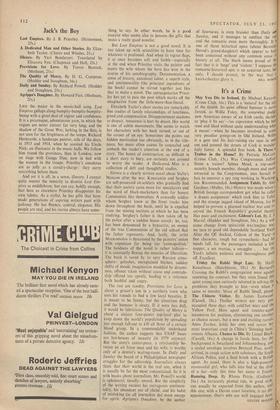Jack's the Boy
A Dedicated Man and Other Stories. By Eliza- beth Taylor. (Chatto and Windus, 21s.) Silence. By Yuri Bondaryev. Translated by Elisaveta Fen. (Chapman and Hall, 25s.) Provisions for Love. By Trevor Bostock.
(Methuen, 21s.)
LIKE the major in the music-hall song, Lost Empires gallops along bumpity-bumpity-bumpity- bump with a great deal of vigour and confidence. It is a picaresque, adventurous yarn, in which the rogues are never sinister for very long, and the shadow of the Great War, lurking in the flats, is not seen for the brightness of the lamps. Richard Herncastle, a landscape painter, tells of the days, in 1913 and 1914, when he assisted his Uncle Nick, an illusionist in the music halls. We follow him round the provinces, then in London, now on stage with Ganga Dun, now in bed with the women in the troupe. Priestley's anecdotes are as jolly as a cavalry-charge: they carry everything before them.
And yet it is all, in a sense, illusory. I cannot quite muster the temerity to dismiss Lost Em- pires as middlebrow, but can say, boldly enough, that here as elsewhere Priestley disappoints his own talents. As a stylist, he has gifts that have made generations of aspiring writers pant with jealousy. He has fluency, control, elegance. His people are real, and his stories always have some-
thing to say. In other words, he is a good essayist who seems also to possess the gifts that make a really good novelist.
But Lost Empires is not a good novel. It is too taken up with actualities to have time for whatever is profound. And when its vigour flags, it at once becomes soft and feeble—especially at the end when Priestley visits the painter and meets the wife whom the hero has won in the course of his autobiography. Documentation, a sense of history, anecdotal talent, a superb style, and sentimentality (the principal ingredients of the book) cannot be stirred together just like that to make a novel. The septuagenarian Priest- ley has yet to pass the post which marks off the imaginative from the little-more-than-literal.
Elizabeth Taylor's short stories are remarkably fine studies of family relationships, of loneliness, greed and compensation. Disappointment shadows to despair, innocence is hurt by deceit. Her world is one of subtle movements. She seems to watch her characters with her back turned, or out of the corner of an eye. Sometimes she points out hidden motivation too obviously, as in the title- piece, but more often causes lie concealed and ambush the reader's attention at the end of a story. The bones of construction, so difficult in a short story to bury, are certainly not around to worry the reader. A Dedicated. Man is a collection of deft and thoughtful studies.
Silence is a clearly written novel about Stalin's Moscow after the war. Konstantin and Serghey are self-possessed ex-soldiers who gradually find that their society cares more for speculators and the word of black-marketeers than for honest Communists like themselves. A cowardly soldier whom Serghey knew at the front tracks him down throughout the book, until he is expelled from the mining institute at which he has been studying. Serghey's father is then taken off by the police after a sudden house search : he, too, has been denounced by a hypocrite, an enemy of the true Communism of the old school that the father represents. And, lastly, the artist Mookomolov is threatened by the painters' union with expulsion for being too 'cosmopolitan.'
The boldness of the novel is rather tedious— it is constantly flexing the muscles of liberalism.
The book is saved by its very Russian atmo- sphere: goloshes, unexplained blushes, sudden shifts of mood, imagination muddled by dreami- ness, offence taken without cause and comrade- ship offered too openly, leading to a reticence both bashful and angry.
The rest are tawdry. Provisions for Love is about a grocer's son in a northern town who
uses his rounds to bed a few local beauties. It
is meant to be funny, but the situations drag and the humour is sleazy. If it were less dull, it would be lubricious. The Quality of Mercy is about a sinister four-power top-level plot to keep down the world's population by spreading just enough fall-out to kill all those of a certain blood group. In a commendably underhand fashion, the author suggests that USAF bases are hot-houses of insanity (in 1979 anyway).
But the story's centre-piece, a relationship be-. tween an air force man and his wife, is worthy only of a dentist's waiting-room. In Daily and Sunday the board of a Philadelphian newspaper struggles for the editorship. Journalists always think that their world is the real one, when it is usually by far the most romanticised. So it is with books about journalism. Mr. Powell's world is ephemeral, tinselly, unreal. But the simplicity of the writing excuses his outrageous sentimen- tality, his abundant use of elicit& and his habit.' of mistaking (as all journalists do) mere energy for spirit. Agrippa's Daughter, by the author
of Spartacus, is even brassier than Daily and Sunday, and it manages to confuse the leg,' and the romantic even more thoroughly. It e one of those historical epics (about Berenice, Herod's grand-daughter) which appear to have been conceived without any common sense of history at all. The blurb seems proud of Or fact that it is 'huge' and 'violent.' I suppose the romantic-historical epic is an acquired taste, hie only, 1 should protest, in the way that g














































 Previous page
Previous page